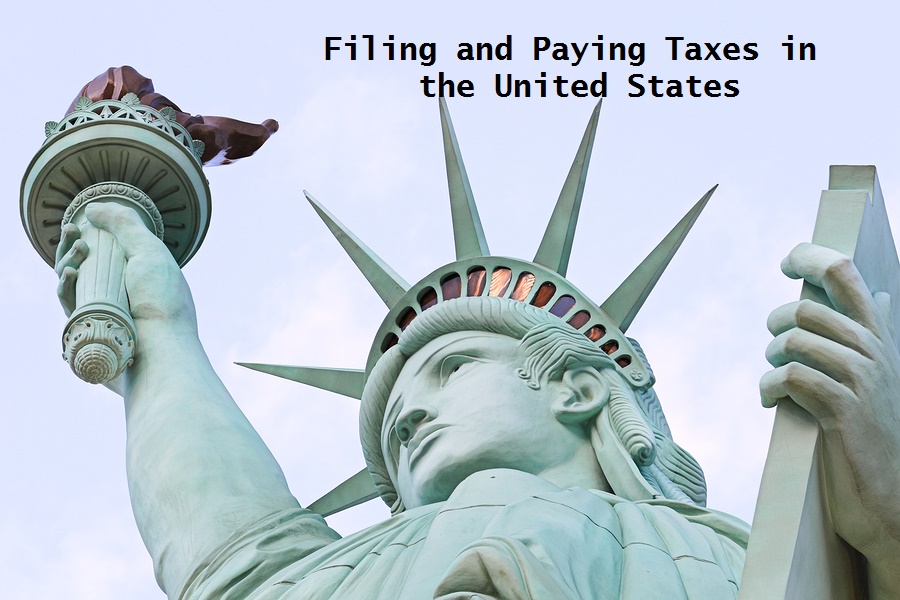
The United States government taxes the worldwide income of its citizens and residents.
If you plan on working in the United States, here are some things you need to know about the US federal income tax system.
The United States taxes residents differently from non-residents, so the first thing you need to do is determine if you’re considered to be a resident or not. Generally, if you’re in the US temporarily because you’re a student, teacher, trainee, foreign government employee or a relative of one of those, then you’re considered to be a non-resident. These Visas are usually labelled as F, J, M, or Q. If you fall into this category, you’re considered to be a “non-resident”. You will file a tax form called 1040NR. This post is mostly about filing a tax return as a resident, a regular 1040 form.
If you are in the US on a regular working Visa (such as an H1) there are two ways to be considered a resident for income tax purposes. One is to have a green card—this form shows that you are a lawful, permanent resident of the United States. The other way to be considered a resident is to meet what’s known as the substantial presence test. The quick and dirty way to figure that out is to ask yourself if you were here for over 183 days this year. If the answer is, “yes” then you can be considered a resident. I’ve attached a substantial presence test questionnaire at the bottom of this post for anyone who needs a more accurate determination, especially if your time here crosses over two or more calendar years.
Qualifying as a US resident usually reduces your American income taxes. The biggest benefit is being able to claim the same “standard deduction” that US citizens claim. The standard deduction is a portion of your income that the government doesn’t tax. Also, as a resident, if you are married, you can file your tax return as “married filing jointly” which gives you a larger standard deduction and a lower general tax rate. For many people, being able to claim “resident” will reduce your taxes.
The downside of being a “resident” is that the United States government taxes the world wide income of its citizens and residents. Let’s say you move to America from France where you earned an income equal to $50,000 USD. You move to the US in June and work for 7 months, easily qualifying you to be a US resident for income tax purposes. While in the US you earn an additional $50,000 USD for a combined global income of $100,000 USD. You do not want to pay US income taxes on the $50,000 USD that you earned in France!
You have two options in this situation: One, you could file a “dual status alien” return— this would make you a US resident for the 7 months that you were here and a non-resident for the 5 months that you were in France. You would not get the full benefit of the resident deductions, but it would save you from being taxed on your French income. The second option would be to file as a US resident and claim a credit for the foreign taxes paid. If you come from a country where your taxes are equal to or higher than in the US, this is a good option for you. If you come from a country with lower taxes, you might be better off claiming the dual status alien. You do not have to decide this now, you can have your tax preparer work out the numbers for you both ways and choose which option works best for you.
A note about hiring a tax preparer in the US. There are many companies that have shops where you can pay someone to prepare your income tax return for you. These are for profit companies, not government agencies, and they expect you to pay them for the service. Most of them do not prepare 1040NR returns, or dual status alien returns at all. If they see that you qualify to be treated as a resident, they will want to proceed with filing your return as a resident. If you had no income in your home country, this is not a problem, and you can feel comfortable filing a US resident return. If you had income in your home country, make sure that the person you are dealing with understands “dual status alien” and “foreign tax credits”. Many tax preparers, especially the ones that set up temporary kiosks in the shopping center, have not been trained in these areas, and it’s essential to you that you hire someone knowledgeable about tax issues for foreign persons.
A common question is: what if I just don’t report my foreign income? How will the IRS know? The IRS has treaties with several countries and there is a great deal of information sharing. Although it seems impossible that the IRS could find out about someone’s foreign wages, when they do have that information, the fines and penalties for not reporting your income are severe. I recommend filing an honest and accurate return, then you’ll never lose sleep worrying about it.
A few other things you should know about income taxes in the United States. Our tax year ends on December 31st. Your income tax form is due by April 15th of the next year. Most states, and even some cities also have their own income tax forms that need to be completed and usually are due at the same time as your federal tax return. Make sure to file all of the returns you need to file, not just the federal. And the US government also wants to know about your foreign bank accounts. Even if you don’t have any taxable income from them, if you have over $10,000 USD equivalent in a foreign bank, you’ll be expected to report that bank account in an FBAR form.
And probably one of the most confusing things about US income taxes is that different circumstances generate different income tax rates. So you and your best friend could be working at the same job and making the exact same amount of money and withholding the exact same amount of tax – and one of you could wind up owing the IRS and the other one could get a huge refund. It happens all the time. There are different tax rates for married people than for single people, and there are special tax credits for children and all of those things affect what your tax bill will be.
My best advice is that if you are new to the United States, it’s a good idea to get some professional help with filing your US tax return. It will cost you some money to have this done, but it will give you peace of mind.
Substantial Presence Test (You can also find this on the IRS website) to determine if you can qualify to file your tax return as a US resident.
You must pass both the 31-day and 183-day tests.
31 day test: Were you present in United States 31 days during current year?
183 day test: [If you weren’t here for the full 183 days during the current year, the time you spent here in prior years counts towards your being deemed a resident.]
Current year days in United States x 1 =_____days [the days you spent here during this year count as full days]
B. First preceding year days in United States x 1/3 =_____days [the days you spent here last year only count as 1/3 days. So if you were here last year for one month (30 days) then it only counts as 10 days]
C. Second preceding year days in United States x 1/6 =_____days [the farther back the time, the less it counts. Two years ago only count as 1/6 of the days, so a month then counts for 5 days.]
D. Total Days in United States =_____days (add lines A, B, and C)
If line D equals or exceeds 183 days, you have passed the183-day test.
Exceptions: Do not count days of presence in the U.S. during which:
you are a commuter from a residence in Canada or Mexico;
you are in the U.S. less than 24 hours in transit;
you are unable to leave the U.S. due to a medical condition that developed in the U.S.;
you are an exempt individual; [basically that’s an F, J, M, or Q visa]
you are a regular member of the crew of a foreign vessel traveling between the U.S. and a foreign country or a possession of the U.S. (unless you are otherwise engaged in conducting a trade or business in the U.S.)


